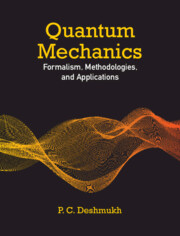Book contents
- Frontmatter
- Dedication
- Contents
- List of Figures
- Foreword
- Preface
- 1 Description of a Physical System
- 2 Path Integral Formulation of Quantum Mechanics
- 3 Probability Tangles and Eigenstates of One-dimensional Potentials
- 4 Angular Momentum
- 5 The Non-relativistic Hydrogen Atom
- 6 Approximation Methods
- 7 The Relativistic Hydrogen Atom
- 8 Quantum Mechanics of Spectral Transitions
- 9 The Many-Electron Atom
- 10 Quantum Collisions
- 11 Introduction to Quantum Information and Quantum Computing
- Appendix A Symmetry of the Hamiltonian
- Appendix B Schrödinger, Heisenberg, and Dirac “Pictures” of Quantum Dynamics
- Appendix C Spherical Harmonics
- Appendix D Occupation Number Formalism Second Quantization
- Appendix E Electron Structure Studies with Qubits
- Index
Appendix E - Electron Structure Studies with Qubits
Published online by Cambridge University Press: 14 September 2023
- Frontmatter
- Dedication
- Contents
- List of Figures
- Foreword
- Preface
- 1 Description of a Physical System
- 2 Path Integral Formulation of Quantum Mechanics
- 3 Probability Tangles and Eigenstates of One-dimensional Potentials
- 4 Angular Momentum
- 5 The Non-relativistic Hydrogen Atom
- 6 Approximation Methods
- 7 The Relativistic Hydrogen Atom
- 8 Quantum Mechanics of Spectral Transitions
- 9 The Many-Electron Atom
- 10 Quantum Collisions
- 11 Introduction to Quantum Information and Quantum Computing
- Appendix A Symmetry of the Hamiltonian
- Appendix B Schrödinger, Heisenberg, and Dirac “Pictures” of Quantum Dynamics
- Appendix C Spherical Harmonics
- Appendix D Occupation Number Formalism Second Quantization
- Appendix E Electron Structure Studies with Qubits
- Index
Summary
Accurate prediction of chemical and material properties from first principles quantum chemistry is a challenging task on traditional computers. Recent developments in quantum computation offer a route toward highly accurate solutions with polynomial cost.
—Jarrod R. McClean, Ryan Babbush, Peter J. Love, and Alán Aspuru-Guzik, J. Phys. Chem. Lett. , 24:4368– 4380 (2014), https://pubs.acs.org/ doi/10.1021/jz501649m.Information processing employing mathematical modeling using qubits has enormous potential in drug development for clinical trials against dreadful diseases. There are many different ways in which a molecule can be folded to optimize a chemical reaction. Designing smart materials for emerging technologies also requires mathematical simulations, most efficiently implemented on a quantum computer. In this appendix, we provide a cursory introduction to the young and expanding field of electron structure studies with qubits.
The original meaning of the term quantum supremacy proposed by John Preskill in 2012 was intended to describe the point where quantum computers can do things that classical computers cannot. It is often interpreted as the demonstrated and quantified ability to process any problem faster on a quantum computer than on a classic computer. The term quantum advantage is also much in vogue; it is used to describe attainment of a quantum computational algorithm in solving a real-world problem faster than on a classical computer. Platforms for the development of quantum computing architecture include (a) quantum gate–based (Chapter 11) and (b) quantum annealing–based approach (which employs optimization techniques akin to those in operations research). Industry giants such as Google, Honeywell, IBM, and Intel use the quantum gate–based platform, while D-wave systems employs quantum annealing.
The quantum phase estimation (QPE) was the first algorithm that was proposed to solve the Schrödinger equation on a quantum computer. It is a fully quantum algorithm to obtain eigenvalues of a Hamiltonian, but it requires rather sophisticated hardware and employs the inverse quantum Fourier transform (IQFT) method. It is a multipurpose program that is a part of other quantum algorithms, including Shor's algorithm. A full configuration-interaction computation that provides variationally the best wavefunction has been carried out using the QPE algorithm [1]. However, QPE requires a very large number of qubits.
An alternative approach employs the variational quantum eigensolver (VQE), which utilizes quantum and classical resources to solve quantum eigenvalue problems [2]. Of specific interest is the study of many-electron correlations.
- Type
- Chapter
- Information
- Quantum MechanicsFormalism, Methodologies, and Applications, pp. 607 - 614Publisher: Cambridge University PressPrint publication year: 2024



